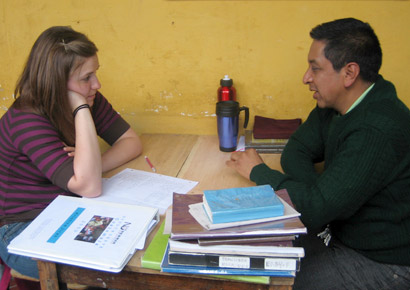In my last
post I described my difficulties acquiring Spanish as a student at university. I
would like to dedicate this post to my experience as a Spanish student in a
Spanish school in Guatemala, where I started speaking the language for the
first time.
I have
always been fascinated with Central America and its culture. After graduating from
university, I went backpacking on my own in Central America, Guatemala being my
first destination. A couple of days after I
had arrived in Guatemala, I realized that I had a problem, because I wasn't
able to communicate with the locals in Spanish. Feeling extremely lost, I could
neither utter a complete sentence in Spanish nor ask a simple question. Having
realized that I must acquire basic Spanish in order to continue my trip, I
decided to change my plans and go to study Spanish for several weeks.
Guatemala is the cheapest country in the world
to study Spanish and Quetzaltenango, or Xela as the locals call her, is the cheapest
place in the country. With more than 40 Spanish schools, this city, which is
not populated with gringos, expats and backpackers as Antigua, another popular
destination to study Spanish, offers better opportunities to the Spanish
learners to practice Spanish with the locals rather than speak English with
travelers. As a result, people from all over the world come to Xela to learn
Spanish and, or volunteer in different social projects.
After I
arrived in Xela, I enrolled at a Spanish school. Most schools have the same daily schedule: in
the morning, a student can choose to learn four or five hours with a private
Spanish teacher; in the afternoon, most schools offer different activities such
as cooking classes, salsa classes, movies and different trips in the area, such
as a trip to hot springs in Xela, Fuentas Georginas, which was definitely one
of my favorites activities in Xela. In addition, many schools offer a homestay
with a Guatemalan family in order to encourage complete immersion in the
language, as the families do not speak English and the student must communicate
in Spanish.
My
Spanish teacher, Norma who is a native Guatemalan, taught me
five hours a day for three weeks. Although she had been teaching foreigners for
more than 10 years, she could barely speak English. In her lessons, mainly putting
emphasis on grammar, she first taught the new material and afterwards I had to
do exercises. At first, I was quite skeptical about being able to enrich my
vocabulary by studying mostly grammar; instead, I actually expanded my vocabulary
through acquiring the words that were covered by the grammar topics. For
example, when I learnt the present tense, I also had to learn the meaning of
the irregular verbs. At the end of the school day, when I was too tired to
study grammar, we used to read children's stories together,
which was a great way of reviewing grammar in a meaningful context.
Significantly, Norma was a very strict teacher; not only did I have to take a
test at the end of each week, but I also had to write an essay every day. She
was so strict that even on the day before my last class; she refused to cut me
some slack and made me write my last essay for the following day. L
What I mostly learnt from this experience is
that when you have to communicate with people whose language you don't speak, after
a short while, you will start speaking their language. This is exactly what
happened to me; once I was surrounded with people who could only speak Spanish,
both at school and at the homestay, I had no other choice but to speak Spanish.
I did whatever I could to be understood, from using the words I had picked up during
my stay to miming.
I like
calling this experience "the Spanish Brainwash Effect" because after
two week I was able to acquire basic Spanish to chat freely with the locals. Only
in Guatemala, after a short amount of time was I able to start speaking
Spanish. Without a doubt, even if I studied Spanish for three years in University , I would
not be able to achieve that level of proficiency.
If you
ever have the time and the money, I recommend that you stay for a
while in a foreign country studying its language. I think that my experience as
a language learner helped
me
identify with my students' frustrations and difficulties, later on in my career
as an English teacher in Israel. In my opinion, every teacher teaching a second
language, especially if this teacher is a native speaker of that language, must
undergo the process of learninga second language
in order to understand his students and become a better teacher.

